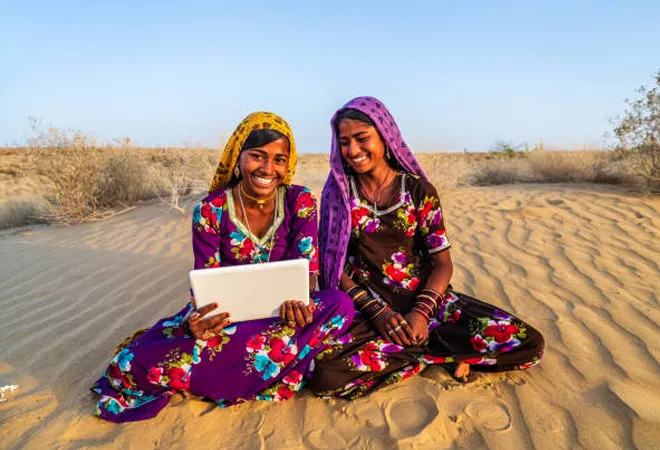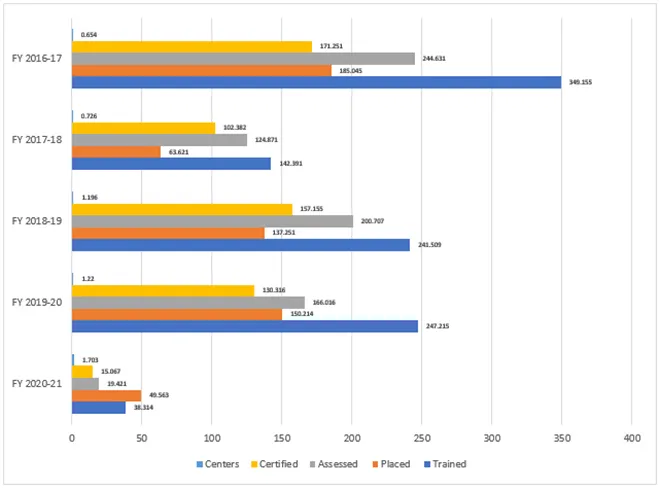
Rural Youth for advancing SDGs
Despite varying definitions of ‘youth’ in India, the country’s rural youth population stand at approximately
67-68 percent of India’s total population. Of the total rural youth population, the male-female ratio remains almost equal at about 52 percent and 48 percent, respectively. Given such statistics, there is no doubt that the actual demographic dividend of the country is titled towards rural India, with the potential to foster rapid economic progress through leveraging the existing massive human capital base. The improvements in education, skilling, and employability for the rural youth are slated to play an extremely important role in driving India closer to the Agenda 2030 of the UN Sustainable Development Goals (SDGs), especially towards the fulfilment of SDG 4 (Quality Education), SDG 5 (Gender Equality), SDG 8 (Decent Work and Economic Growth), and SDG 9 (Industry, Innovation and Infrastructure).
Both the government and private sectors have an important role to play in facilitating the interaction between the demand-supply forces, with efficient response mechanisms and lower transaction costs.
What becomes absolutely essential in this context is to constantly close the gap between the demand and supply in the domain of rural skilling. While there is a persistent demand for skilling programmes, it needs to be constantly enhanced through better access in rural spaces and awareness methods. On the other hand, the supply side also needs to be ramped up in tandem with the requirements through better incentives and innovative programmes that cater to the needs of the diverse communities, socio-economic settings and geographical regions in India. Most importantly, both the government and private sectors have an important role to play in facilitating the interaction between the demand-supply forces, with efficient response mechanisms and lower transaction costs. While there are many government schemes in place towards skill upgradation and enhancing the employability of India’s rural youth, the Deen Dayal Upadhyaya Grameen Kaushalya Yojana (DDU-GKY) launched in 2014, is one such seminal scheme that aims to “transform rural poor youth into an economically independent and globally relevant workforce." Figure 1 outlines the performance under DDU-GKY in the last few years.
Figure 1: Trends in DDU-GKY (in thousands)
 Source: Authors own, data from Ministry of Rural Development, Government of India
Source: Authors own, data from Ministry of Rural Development, Government of India
A case study: Kanchan Ben’s skilling pursuits in Gujarat
Kanchan Ben Thakor, hails from a family of seven in the Chalwada village of Patan District in northern Gujarat. She recalls how one of her elder sisters motivated her to join the government skilling initiative for tailoring under DDU-GKY about three years back. The skilling programme was facilitated by a non-profit organisation at the local Rural Self Employment Training Institute (RSETI), which is mandated to be equipped with dedicated infrastructure in every district of the country by the Ministry of Rural Development—to impart training and skill upgradation for entrepreneurial development of the rural youth in partnership with the respective state governments, banks, and other developmental organisations. Currently, the 21-year-old has her own sewing business for stitching clothes, alterations and embroidery; and has also provided training to three more women in the recent past.
Kanchan Ben’s parents are agricultural workers and given their financial situation, it is a relief for the family that she can contribute substantially to the household expenses. She completed her higher secondary education and then took a gap year. It was during this time that she undertook this tailoring course of about an hour’s training every day for two months. Proudly exhibiting the completion certificate from the programme, she mentions how it has helped her fetch a thousand rupees discount on the purchase of her sewing machine. Although currently she is enrolled for a bachelor’s degree in Sanskrit through a part-time correspondence course at a local university, the tailoring business is what she is most excited about. “I have gotten extremely busy now with tailoring orders coming in from various corners of my village. Although it gets extremely difficult to manage my business alongside the household chores and studies, I can earn about INR 400 a day from my tailoring orders,” she exclaims.
The enthusiastic micro-entrepreneur is also very keen on undertaking a beautician course to establish her own beauty parlour, while she has already filled up her applications for the posts of junior clerk and secretary at the local Panchayat.
Kanchan Ben, with no immediate plans for marriage, has also a future agenda in place. “As the next step, I want to rent out my own stitched garments for special occasions such as
Navratri or marriage ceremonies in my village. Although my family won’t allow me to expand the business to bigger towns and cities, I intend to continue with my business even after marriage,” she mentions with fervent determination. The enthusiastic micro-entrepreneur is also very keen on undertaking a beautician course to establish her own beauty parlour, while she has already filled up her applications for the posts of junior clerk and secretary at the local Panchayat.
Conclusion
Women are at the heart of the socio-economic transformation of India’s rural economy. It is essential that rural youth are empowered through skilling measures such as tailoring that helps promote self-reliance through cost-effective investments in sewing machines. Thus, encouraging women to pursue entrepreneurial activities, such as in the case of Kanchan Ben, not only helps in mitigating unemployment and enhancing financial independence but also in increasing the marriageable age for women in rural areas.
Encouraging women to pursue entrepreneurial activities, such as in the case of Kanchan Ben, not only helps in mitigating unemployment and enhancing financial independence but also in increasing the marriageable age for women in rural areas.
Training the rural youth through education programmes and skilling initiatives to enhance entrepreneurial abilities, employability, and financial independence become extremely pertinent in contemporary times for mainly three reasons. Firstly, given a certain level of saturation in agricultural work, the increasing trends in rural to urban migration (the rural to urban migration jumped by
51 percent from the census in 2001 to 2011) for employment create excessive pressure on the civic infrastructure in urban and semi-urban areas leading to unsustainable living conditions, directly impeding the progress towards SDG 11 (Sustainable Cities and Communities). Therefore, the reversal of migration patterns to a certain degree is of utmost importance. Secondly, a large proportion of the rural youth who are oriented towards white-collared jobs but do not have the access to professional education add to the unemployment woes of the country, which needs immediate corrective measures. Such involuntary unemployment often leads to social issues such as
anti-social activities for their livelihood, impacting SDG 16 (Peace, Justice and Strong Institutions). Thirdly, the gradual shift from agrarian skills to training for more complex goods and services in rural India could set the stage for ‘
economic sophistication’ of the Indian economy, advancing SDG 8 (Decent Work and Economic Growth) and SDG 9 (Industry, Innovation and Infrastructure). Such transitions are determined by the capabilities required, human and physical capital inputs, and the institutional systems needed in the production processes.
<1> Based on an in-person interview with Kanchan Ben Meghraj Bhai Thakor at Chalwada village, Patan district in Gujarat on 6
th July, 2022. She has granted permission to the author to use her original name and age for publication.
The views expressed above belong to the author(s). ORF research and analyses now available on Telegram! Click here to access our curated content — blogs, longforms and interviews.





 PREV
PREV


